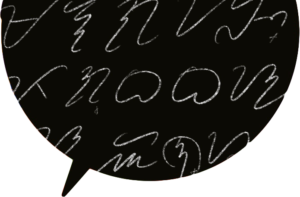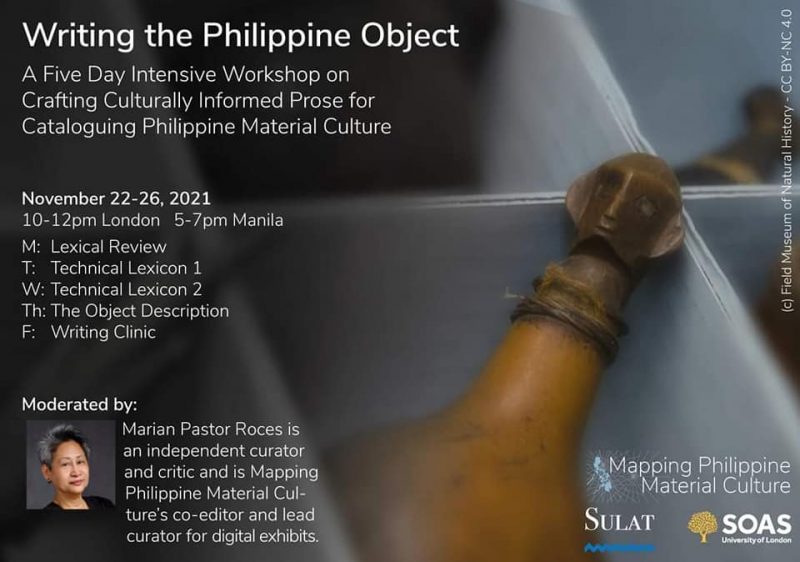
Writing The Philippine Object

Culturally Informed Writing:
This series of five two-hour workshops will be held to equip interested curators, collectors, scholars, in writing culturally informed object descriptions for cataloging Philippine objects. The plan is to conduct 5 sessions of 2 hours each to cover as much ground as necessary for a macro view of Philippine material culture as a field of study; and micro-level work that goes into registers of words, phraseology, and if necessary sentence construction.
Workshop Programme:
(November 22) Workshop 1: Lexical Review
To commence the series, the first workshop updates the anthropological, archeological, linguistics, social science, and humanities work on the peoples of the Philippines to the present time. Readings will be given to the participants a week ahead of the workshop date .The workshop will revisit and problematize the following words, among a number of others. In the course of the discussions on each, the current relevant literature is reviewed: Tribe, Kingdom, King, Queen, Prince, Princess, Royalty Nation, Blood, Race, Malay, Ilustrado, Slave, Filipino, Asia, Asian Minority, Tradition, Authenticity, Motif, Design, Art, Civilization Craft, Igorot, Aeta, Negrito, Moro
(November 23, 24) Workshop 2 – 3: Technical Lexicon
The range of techniques that comprise the traditional ways of making cultural material in the Philippine archipelago is discussed in relation to a cartographic frame: the extent of use of particular techniques in island Southeast Asia, time frames, and homelands of ethnolinguistic groups. The range includes Weaving: Woven-in patterning, Reverse/Reserve Dyeing, Surface Augmentation, Tapestry Metal-smithing: Repoussé, Cire perdue, Casting, Granulation, Gear Beadmaking, Filigree, Woven gold, Inlay Wood and Stone Working: Sculpture/Carving, Relief, Inlay Assemblage Boat-Building: Dug-out Carving, Plank-built Walling, Lashing and Tying Mat Weaving Basketry Earthenware: Coiling, Paddling, Molding, Potter’s Wheel-Turning
(November 25) Workshop 4: Object Description
By the 4th session, the participants would have been familiar with both the museological vocabulary and the issues posed by some traditions of language use. The participants can at this juncture proceed to a series of object description exercises, assigned randomly to 5 objects each. The objects are from different museums in the world, although all will have a Philippine provenance. The clinic-style approach programs immediate response from the mentor. It is mainly for this reason that the workshop series is for a limited number of participants (maximum 25) close monitoring of progress is part of the series design. Mentor response will include: Guided use of technical vocabulary Sentence construction in relation to the use of technical vocabulary Considerations of alternative word use Advice in relation to descriptions of form and patterning Possible citations of available literature pertaining to object description.
(November 26) Workshop 5: Writing Output
The series ends with the participants writing on one object they select from an array provided from the Mapping site. Another writing clinic will follow.
